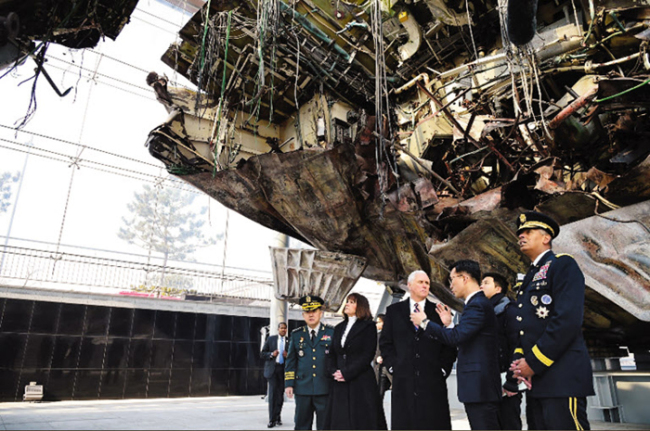Eight years since Cheonan sinking, S. Korea still mired in controversy
By Yeo Jun-sukPublished : April 5, 2018 - 16:04
In March 2010, the South Korean Navy ship Cheonan sank in the West Sea just south of the de facto maritime border with North Korea near Baengnyeong Island. Of the 104 South Korean sailors on board, 46 were killed or remain missing.
A multinational investigation team led by the South Korean military later concluded that the warship was sunk by a North Korean torpedo fired from a midget submarine. North Korea denied its involvement while controversy over the cause of the sinking roiled South Korea.
The controversy has been brought back into the spotlight in South Korea, following a public broadcaster’s reports questioning the joint investigation at a time when the Moon Jae-in administration is preparing for a summit with North Korean leader Kim Jong-un to ease military tension on the Korean Peninsula.
North Korea maintains that the Cheonan sinking is “complete fabrication” driven by South Korean conservatives with a hawkish stance toward North Korea, warning the Moon administration not to refute its argument ahead of a “historic juncture.”

“If South Korea claimed otherwise and shows ambivalence, it would just damage the efforts to improve the inter-Korean relations. The South Korean government should bear in mind that they would pay dearly for their careless act at a crucial time.”
Largely considered as a North Korean attack over the past years by previous administrations, the controversy was reignited last month when South Korea’s public broadcaster KBS questioned the military’s 2010 investigation into the Cheonan sinking.
Citing those participating in a salvage operation, KBS reported that Cheonan might not have exploded from a torpedo attack. The 2010 investigation suggested that the warship was ripped into two after being torpedoed by the midget submarine.
The broadcaster also raised speculation that a closed-circuit video capturing the final moments of the warship might have been fabricated by the military. The footage was delivered by a South Korean activist who claimed the warship sank after running aground, not after being torpedoed.
“In every case, the initial situation holds most of the truth,” said Sin Sang-cheol, who served as a civil expert for the joint investigation in 2010, citing footage in which the sailors remained calm despite choppy waters hours before the sinking.
The allegation prompted outrage among conservative lawmakers and survivors of the Cheonan sinking who have accused the Moon Jae-in administration of neglecting the incident out of concern that it may hamper the inter-Korean detente.
Fueling the anger was a controversial remark made by Kim Yong-chol, who is suspected of orchestrating the Cheonan sinking when he served as the chief of the General Reconnaissance General Bureau in 2010. Tasked with clandestine operations against South Korea, the agency is said to have overseen submarine operations.
During his meeting with South Korean reporters on Monday, Kim, who now serves as a vice chairman of North Korea’s ruling Workers’ Party Central Committee, introduced himself as the person “South Koreans described as a mastermind of the Cheonan sinking.”
His light-hearted comments, which came as a part of his apology for limiting reporters’ access to inter-Korean performances in Pyongyang last week, drew ire from those who had expected Kim to deliver a formal apology or acknowledge the sinking.
“Kim’s remark is nothing but a mockery and an insult to the entire South Korea,” said Rep. Jun Hee-kyun, a spokesperson for the main opposition Liberty Korea Party. “Instead of demanding an apology, the government is so careful about what Kim Jong-un thinks.”
While the Defense Ministry reaffirmed that Cheonan was sank by North Korea’s torpedo, it declined to pinpoint who ordered the attack. Cheong Wa Dae took a similar stance out of concern that attributing Kim Yong-chol to the sinking would hamper the mood for talks.
“I don’t think it is appropriate to comment on (Kim Yong-chol’s) comments,” the ministry’s spokesperson Choi Hyun-soo said during a regular press briefing Tuesday. “Those who covered Kim know better than what he was getting at.”
The spokesperson added that although it is proven that Cheonan was attacked by the North Korean torpedo, it is difficult to pinpoint who and which agencies gave such orders. Further investigation is needed to find out those behind the attack, she added.
The US government, meanwhile, reiterated that North Korea is responsible for the Cheongan sinking. According to Voice of America, the US State Department’s spokesperson Kanita Adams said the US has not changed its position to support the multinational investigation in 2010.
(jasonyeo@heraldcorp.com)







![[Graphic News] More Koreans say they plan long-distance trips this year](http://res.heraldm.com/phpwas/restmb_idxmake.php?idx=644&simg=/content/image/2024/04/17/20240417050828_0.gif&u=)
![[KH Explains] Hyundai's full hybrid edge to pay off amid slow transition to pure EVs](http://res.heraldm.com/phpwas/restmb_idxmake.php?idx=644&simg=/content/image/2024/04/18/20240418050645_0.jpg&u=20240419100350)





![[From the Scene] Monks, Buddhists hail return of remains of Buddhas](http://res.heraldm.com/phpwas/restmb_idxmake.php?idx=652&simg=/content/image/2024/04/19/20240419050617_0.jpg&u=20240419175937)

![[KH Explains] Hyundai's full hybrid edge to pay off amid slow transition to pure EVs](http://res.heraldm.com/phpwas/restmb_idxmake.php?idx=652&simg=/content/image/2024/04/18/20240418050645_0.jpg&u=20240419100350)

![[Today’s K-pop] Illit drops debut single remix](http://res.heraldm.com/phpwas/restmb_idxmake.php?idx=642&simg=/content/image/2024/04/19/20240419050612_0.jpg&u=)